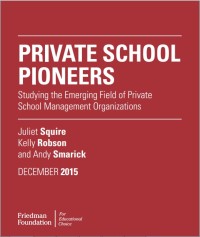A new report looks at a key aspect of the Catholic school renaissance we've explored before on this blog: The rise of private school management organizations — which, it turns out, are not confined to Catholic schools.
 The report, from the Friedman Foundation for Educational Choice, looks at the rise of these private school networks, which borrow some features from their cousins in the charter school world.
The report, from the Friedman Foundation for Educational Choice, looks at the rise of these private school networks, which borrow some features from their cousins in the charter school world.
Charter management organizations like KIPP and education management organizations like Charter Schools USA now run a third of America's charter schools, providing financial backing, back-office support and other advantages to schools in their networks.
According to the report, new organizations are starting to do similar things for private schools.
These budding private school management organizations (PSMOs) are independent entities that operate or help operate three or more private schools. They are a potentially important innovation in the supply of private schools.
The authors — Kelly Robson, Juliet Squire and Andy Smarick of Bellwether Education Partners — tracked down 14 organizations that meet their definition, which means they exist outside the government or existing church structures. Eight of the organizations have some kind of church affiliation. Most of those, including the two that are active in Florida, are Catholic. There's also a network of Lutheran schools.
The 14 organizations operate 134 private schools, serving nearly 42,000 students. Put another way, their networks combined are still smaller than KIPP's network of charter schools. The authors note they account for less than 1 percent of private school enrollment nationwide.
While they're small now, the report highlights some reasons to be bullish about them. Coupled with scholarship and voucher programs, they're helping to lead a rebirth of urban private schooling, especially among Catholic schools, which are already concentrated in neighborhoods where they can reach large numbers of disadvantaged students.
The authors say there's room for both charter- and private-school networks to grow in most communities. Private schools, with their relative freedom from government regulation and, in many cases, their status as long-standing community institutions, should be part of the school choice mix. There's also a lingering debate, and some conflicting research, on whether private schools or charters have the better track record with improving student outcomes.
The authors call for more research on whether the new private school management organizations are improving the performance of the schools they serve, either by taking over existing schools, reopening ones that closed, or launching new ones.
The growth of these private-school networks has policy implications. If established organizations are opening new schools aimed at disadvantaged students who rely on scholarship programs to pay their tuition, regulations like Louisiana's, which limit the number of voucher students new private schools can accept, could hold back their progress.
See more about the report on Bellwether's blog, here and here.